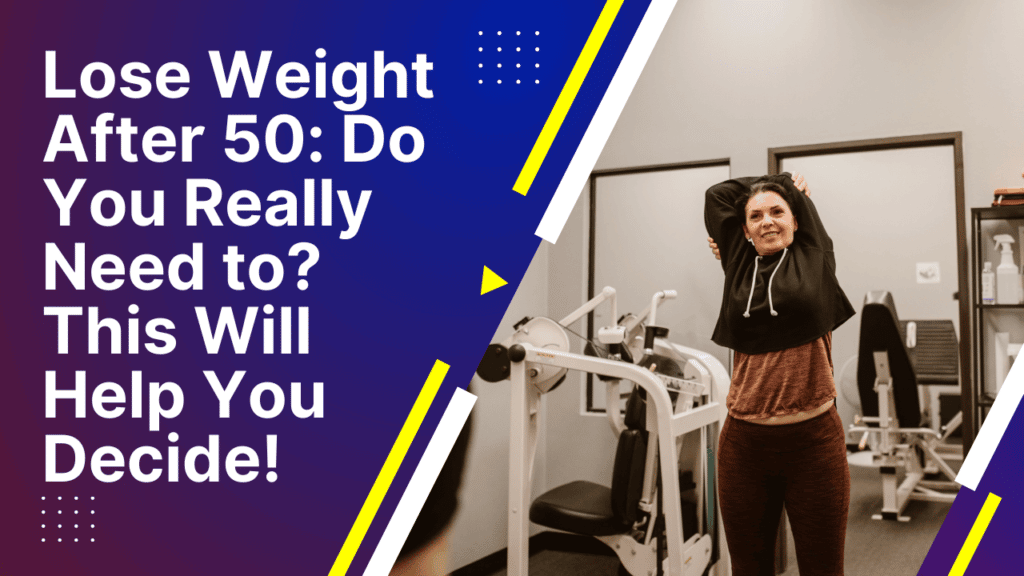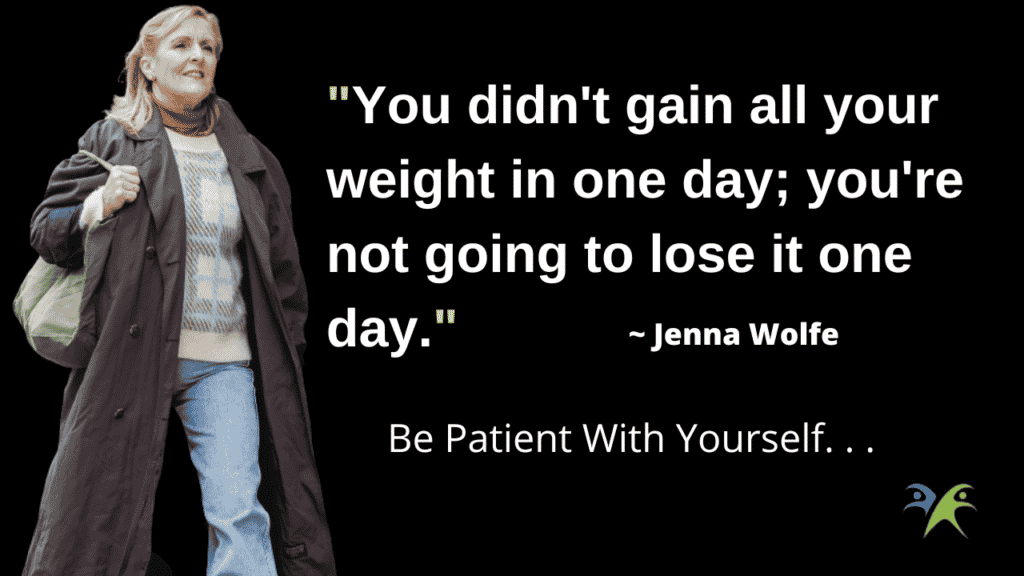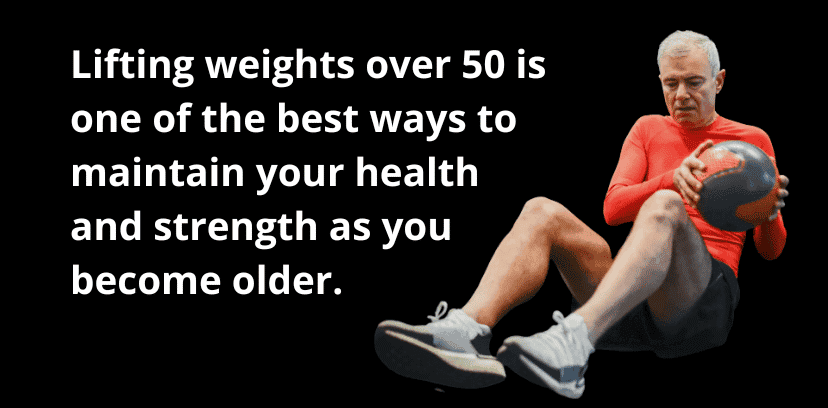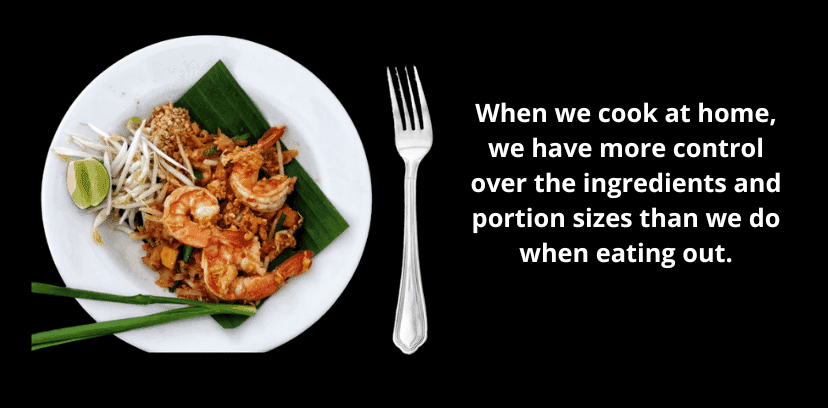Lose Weight After 50: Do You Really Need to?

Disclosure: You should be aware that some of the links in this article may be affiliate links, which means that if you decide to buy something through one of these links, I may receive a commission. This site does not provide financial or medical advice and is just for entertainment purposes. In our privacy policy, you may see our affiliate disclosure.
The answer to this question is a little more complicated than a simple yes or no. It depends on a number of factors, including your current weight, your age, and your health.
Generally speaking, however, it is recommended that people over 50, lose weight gradually as they get older in order to reduce the risk of health problems associated with obesity. So if you’re overweight or obese, it’s likely advisable for you to start making changes to your diet and exercise habits in order to lose weight.
Yes, you may need to lose weight after 50. This is because your body’s metabolism starts to slow down as you age, and you may start to gain weight as a result. However, it is important to speak with your doctor before starting any weight loss program, to ensure that it is safe for you.
There are many safe and effective ways to lose weight, so there is no need to feel overwhelmed. You are more likely to have health problems if you are overweight. For example, you might be more likely to have a heart attack or stroke.

FREE
Weight Loss eBook
Discover How To Get Rid of Stubborn Belly Fat the Easy Way and Forever.
It can be difficult to know when you’ve reached your “ideal weight,” especially if you don’t regularly weigh yourself. But for most people, being at or below their BMI (body mass index) is a good starting point.
You may not know how to lose weight after the age of 50 because your body is changing and the way you treat it is also changing.
The loss of muscle mass that occurs as we age means that our energy requirements aren’t quite as high. A tendency to consume the same number of calories we did when we were younger, even when our bodies no longer require as much energy as they did then, can result in weight gain.
One further thing to think about, particularly for women, is the hormonal shift that their bodies are going through during this time.
Some women go through menopause and have hormonal imbalances, which can lead to increased water retention and can be addressed with diet regimens designed specifically for menopause.
Why is losing weight after 50 hard?
Your body doesn’t work as well as it used to when you were younger. You might not be able to move as well or eat as much without gaining weight.
Losing weight after 50 is hard because it takes more time and effort to lose weight as you get older. The reason for this is that your body changes as you age. You may find that you don’t have as much energy as you used to, or that your metabolism has slowed down. This means that you need to be a bit more careful about what you eat and how much you exercise in order to lose weight.
It takes more time and effort to lose weight as you get older, which can make weight loss a challenge for people of all ages. This is due to the fact that as you become older, your body naturally slows down its metabolism.
For instance, if you are attempting to win a race when you are older compared to when you were younger, it will be more difficult for you to do it. The same is true for getting rid of excess weight as one gets older: it requires more time and effort to accomplish.
Table of Contents

Make strength training part of your regular exercise routines.
Include resistance training as a regular part of your workout program.
Increasing the strength of your muscles can be accomplished through the practice of strength training.
You can accomplish this goal by lifting weights, working out with resistance bands, or performing exercises that only use your own body weight. Lifting weights is one of the best ways to maintain your health and strength as you become older.
A trip to the gym where you lift weights and engage in other activities designed to build muscle is an example of strength training. Strength training is one of the activities that can assist you in maintaining your health and fitness levels. It’s possible that you’ll get more powerful and have more energy. Working out your muscles helps keep your bones in good shape as well.
Strength training is a sort of physical exercise that involves the use of resistance to produce muscular contraction in order to develop the strength, size, and endurance of skeletal muscles.
This type of exercise is typically performed by using weights or other forms of resistance. Because it can assist in enhancing one’s overall health and fitness and lessening the chance of injuries, strength training is an essential component of the routines of many individuals who participate in regular physical activity.
Strength training has the potential to be a healthy and efficient method of enhancing both muscle mass and strength.
Let go of old “rules” about weight loss and cultivate a mindset of wellness.
Keeping yourself healthy and happy seems to be as simple as getting some exercise, eating well, getting plenty of rest, and maybe even finding a way to relieve stress if you’re really focused. It doesn’t matter if we’re actively working on it or just dreaming about the day when we can.
The truth is that your health and well-being go much beyond what meets the eye. Not only that, but it’s something you can do right now, right where you sit, to enhance your quality of life, no matter where you are on the path.
The Well-Being Mindset refers to a state of mind that is independent of one’s physical well-being. It’s not a requirement to be healthy or fit, but rather a way of thinking that allows you to feel “well” no matter what your physical body, emotions, or surroundings are like.
More simply, the Well-Being Mindset is about how you deal with yourself when life’s ups and downs come your way. There is no “wrong” or “poor” way to live according to the Well-Being Mindset than not losing 10 pounds.
To put it another way: You can accept, love, and care for yourself no matter how much weight you gain. As your partner, it doesn’t require “results” in order to help create the feelings you desire.
However, just because you have the “correct” frame of mind doesn’t mean you can binge on sugar all day and expect to stay in shape. Your perspective on life and the world doesn’t have to be based on what you’ve achieved.
As a result, you cultivate a sense of inner happiness, thankfulness, and acceptance that is with you throughout the day. Furthermore, if you have these characteristics, you will revere your body and treat it with reverence, which is just as vital to your health as what you put into your body through your diet.

Don't skip meals.
It is important not to skip meals in order to maintain energy levels and focus throughout the day. When you skip meals, you are more likely to feel tired, irritable, and stressed.
This can negatively affect your work performance and ability to concentrate. It is important to have a balanced diet and eat regularly throughout the day to stay energized and focused.
When you skip meals, your body goes into starvation mode and starts to store fat. This is because your body thinks it’s in danger of not getting food and needs to store energy in case of future famine.
When you finally eat again, your body will be more likely to store the food as fat because it doesn’t know when it will next get food. So, make sure to eat regularly throughout the day to avoid putting your body into starvation mode.
It is important to eat regularly throughout the day in order to maintain optimal energy levels and focus. Eating small, frequent meals helps to keep blood sugar levels stable and prevents cravings for unhealthy foods.
When you go too long without eating, your body goes into starvation mode and starts storing fat instead of burning it. Skipping meals can also lead to stomach problems and indigestion. Make sure to have a healthy snack or meal every 3-4 hours to stay energized and focused.
Eat less
It’s possible that your physician will instruct you to “eat less” in order to help you shed excess pounds or keep up a healthy weight. This is sound advice since if you consume an excessive amount of food, you will put on weight.
The explanation for this is straightforward: if you consume more calories than your body needs, it will save the difference in the form of fat. Therefore, in order to shed some pounds, you will need to reduce the number of calories you put into your body each day by eating fewer foods.
When it comes to the topic of what exactly constitutes “less,” there is no single, conclusive answer. Having said that, one way to tackle the problem would be to think about the idea of energy balance.
It is commonly believed that in order to lose weight, a person must consume less calories than they expend each day. This is the formula for weight loss. This can be accomplished by either consuming fewer calories or expelling more of them through physical activity.
The choice of food is also an important aspect to take into consideration. Selecting foods that are low in calories and bad fats but high in fiber and protein might help you feel full while eating fewer calories overall. This is one strategy for losing weight.
Make increasing your protein intake a priority.
There is a growing body of scientific evidence indicating that protein intake is an important factor in overall health and well-being.
In fact, research suggests that increasing your protein intake may be a priority, especially as you get older. Protein plays a critical role in maintaining muscle mass, promoting weight loss, and helping to regulate many important bodily functions. Protein can also help you feel fuller longer, making it easier to stick to a healthy diet.
Most individuals in the United States consume a diet that is deficient in protein. This can have negative consequences for overall health and athletic performance. Increasing your protein intake should be a priority if you want to improve your health and/or performance. Protein is essential for building and repairing muscle tissue, and it also plays a role in maintaining a healthy weight.
There are many different sources of protein, so it is easy to include enough protein in your diet. Animal-based proteins, such as meat, poultry, and seafood, are complete proteins and contain all the essential amino acids your body needs.
Plant-based proteins, such as beans, nuts, and seeds, are often incomplete proteins, meaning they don’t have all the essential amino acids. However, by eating a variety of plant-based foods throughout the day, you can ensure you’re getting all the essential amino acids your body needs.
However, by eating a variety of plant-based foods throughout the day, you can ensure you’re getting all the essential amino acids your body needs.
Eat more home-cooked meals.
Complex academic jargon would say that by eating home-cooked meals, one is able to have more control over the ingredients and nutritional value of the food they are consuming.
This can be beneficial in terms of both weight management and overall health. Additionally, preparing meals at home can be a cost-effective way to eat, especially if one takes advantage of grocery sales and uses leftovers creatively.
There’s been a lot of research on the benefits of home-cooked meals in recent years, and the general consensus is that they’re healthier and cheaper than eating out. Home-cooked meals are also a great way to spend time with your family and friends, and they can be a lot of fun to cook together. If you’re looking for some new recipes to try out, there are plenty of websites and cookbooks out there with healthy, affordable recipes.
One potential benefit of home-cooked meals is that they are typically lower in calories and fat than meals from restaurants. When we cook at home, we have more control over the ingredients and portion sizes than we do when eating out. Cooking at home also allows us to save money on dining out.

Add whole foods, to your diet, especially in the morning.
Adding whole foods, protein, fiber, and good fat to your diet is especially important in the morning. Eating a balanced breakfast helps to provide sustained energy throughout the day and can help to regulate blood sugar levels.
Protein is essential for building and repairing muscles, while fiber helps keep you regular and can improve digestion. Good fats, such as Omega-3s, are beneficial for maintaining heart health and preventing chronic diseases.
When you add whole foods, protein, fiber, and good fat to your diet, you are providing your body with the nutrients it needs to function at its best. Eating these foods, especially in the morning, can help you feel more energized and focused throughout the day.
Additionally, adding protein and fiber can help you stay fuller longer, which can lead to weight loss or maintenance. Including good fats in your diet is important as they can help improve your mood, cognitive function, and overall health.
When it comes to weight loss, things like protein and fiber can be incredibly important. Protein helps to build muscles, which in turn can help you burn more calories throughout the day.
Fiber is similarly beneficial, as it helps to keep you feeling fuller for longer periods of time, which can lead to reduced calorie intake and weight loss. By adding more protein and fiber to your diet, you can help make your weight loss goals a reality.
Pay attention to your body's composition.
Your body composition is important for overall health and wellness. Maintaining a healthy weight and reducing your risk of chronic disease is easier when you are aware of your body composition.
Healthy body composition is generally one that has a lower percentage of body fat and a higher percentage of lean muscle mass. To achieve or maintain healthy body composition, you should eat a balanced diet, exercise regularly, and avoid unhealthy behaviors like smoking and excessive alcohol consumption.
Balanced diets are important because they provide the body with a variety of nutrients that it needs to function properly. Different foods contain different nutrients, so it’s important to eat a variety of foods in order to get all of the nutrients that the body needs. A balanced diet also includes plenty of fruits and vegetables, which are high in antioxidants and other beneficial nutrients.
Maintaining a healthy weight and being physically active are key factors in having a healthy body composition. Being overweight or obese can lead to a number of health problems, including heart disease, diabetes, and cancer. Exercising regularly and eating a healthy diet are the best ways to maintain a healthy weight and body composition.
Don't eat at night.
There is no one specific reason why you should not eat at night, but rather a combination of factors that can contribute to weight gain. First of all, when you eat late at night, your body is not able to burn off those calories as efficiently as it would if you ate earlier in the day. Additionally, eating close to bedtime can cause discomfort and interrupted sleep, both of which can lead to fatigue and weight gain.
There is no one-size-fits-all answer to this question, as the ideal time of day to eat may vary depending on the person’s goals, lifestyle, and individual biology.
However, many experts agree that eating late at night can be detrimental to one’s health. Eating close to bedtime can interfere with sleep quality and quantity, and can also lead to weight gain and other health problems.
Reduce sugar consumption.
The World Health Organization recommends limiting sugar consumption to less than 10% of daily caloric intake in order to reduce the risk of obesity and tooth decay. Too much sugar in the diet can lead to weight gain, which can increase the risk of developing cardiovascular disease, type 2 diabetes, and other chronic conditions.
Additionally, sugar is a major contributor to cavities. By limiting sugar intake, people can improve their overall health and reduce their risk of developing chronic diseases.
There is a great deal of research that suggests limiting sugar consumption can have a positive impact on overall health. For example, consuming too much sugar has been linked to obesity and various chronic diseases, such as diabetes and heart disease.
By reducing the amount of sugar in your diet, you may be able to improve your overall health and reduce your risk of developing these chronic conditions.
Reducing the amount of sugar in your diet means consuming less foods and drinks that are high in added sugars. This can be achieved by reading food labels and choosing products with lower sugar levels, preparing meals at home using fresh ingredients, and avoiding processed foods.
It’s also important to moderate your intake of sweet treats and sugary drinks. Gradually reducing the amount of sugar you consume over time can help make these changes easier to stick to.
Too much sugar in the diet can lead to weight gain, which can increase the risk of developing cardiovascular disease, type 2 diabetes, and other chronic conditions.
Don't forget to stay hydrated.
Maintaining proper hydration is essential for overall health, and can be achieved by drinking enough fluids and eating hydrating foods. However, many people turn to sugary drinks and sports drinks in an effort to stay hydrated.
While these beverages may provide a temporary boost of energy, they are not the healthiest way to hydrate. Sugary drinks can lead to weight gain and tooth decay, while sports drinks are high in sodium and can contribute to high blood pressure.
It is important to stay hydrated the healthy way by drinking plenty of water and avoiding sugary drinks. Sugary drinks are harmful to our health because they can cause weight gain, tooth decay, and type 2 diabetes. By contrast, water is calorie-free, helps us feel full, and is essential for our body’s functions. So drink up and stay healthy!
The recommended amount of water is eight 8-ounce glasses per day. Our bodies need water to function properly, and we can become dehydrated if we don’t drink enough fluids.
When we’re dehydrated, our body doesn’t have enough water to carry out its normal functions, which can lead to health problems. Drinking enough water is especially important in the summer, when it’s easy to become dehydrated from exposure to the sun and heat.
Make sure you get enough sleep.
It has been shown that getting enough sleep is important for overall health, and this is especially true for people over the age of 50. According to the National Sleep Foundation, adults over 50 should aim to get 7-8 hours of sleep per night. Getting adequate sleep can help improve mood, cognitive function, and overall health.
There are many benefits to getting enough sleep over 50. Sleep deprivation can lead to a number of health problems, including heart disease, stroke, and diabetes. It can also lead to weight gain and increase your risk for cancer.
Getting enough sleep helps keep your immune system strong, regulates your blood sugar, and helps protect against inflammation.
Additionally, sleep is essential for cognitive function and memory consolidation, so getting enough sleep can help improve your focus, concentration, and mental clarity. Getting enough sleep can also help improve your mood and reduce stress levels.
Summary
In conclusion, it is important to lose weight gradually as you get older to reduce the risk of health problems associated with obesity. Losing weight too quickly can actually cause more harm than good, so it is important to consult with a doctor before starting any kind of weight-loss plan. There are many different ways to lose weight safely and effectively, so there is no need to feel overwhelmed. Just remember to take things slow and steady, and you will be on your way to a healthier lifestyle in no time!

FREE
Weight Loss eBook
Discover How To Get Rid of Stubborn Belly Fat the Easy Way and Forever.
Disclosure: You should be aware that some of the links in this article may be affiliate links, which means that if you decide to buy something through one of these links, I may receive a commission. This site does not provide financial or medical advice and is just for entertainment purposes. In our privacy policy, you may see our affiliate disclosure..




